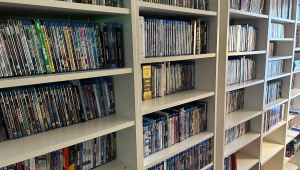The Battle of Hilton Peak

While the conference covers a range of topics, I was most interested in two separate seminars covering the ongoing battle between HD DVD and Blu-ray. The first, "The Format War Is Over! No Wait, This Just In…" on day 1 and "Next Gen DVD Hardware Outlook" on day 2.
I wish I could say that a battle royal ensued, after which the losers slinked away and the winners hoisted a victory flag atop Mount Hilton, the highest point in the Universal City complex. No such luck. But some interesting information surfaced, as well as some polite but mildly heated exchanges.
Day 1 was the more staid. The discussions included representatives from Warner, Paramount, Sony, and Disney, plus Pioneer, Microsoft, and moderator Russ Crupnick from the NPD Group (parent company of DisplaySearch). Notable by their absence were two major studios, Universal and Fox.
Russ Crupnick kicked it off with some interesting stats. About 66M (million) consumer households are expected to have HDTV by 2011. And an estimated 40% of packaged media sold that same year will be in HD. That means HD on disc.
But 32M current HD households don't currently have a next-gen HD disc player. (Next-gen appeared to be the event's preferred, non-denominational term for both HD DVD and Blu-ray.) What's more, only 11% of them have expressed an interest in acquiring such a player within the next 6 months. Still, if they all do so, that's an additional 3.2M players in the field—more than the current total, including PS3.
But why is the interest in next-gen players so low? A heavy percentage of HD owners perceive HD as mainly a sports experience, slightly more, in fact, than rate movies as their favorite HDTV programming. Also, many HDTV owners feel that DVD already fits the bill—and in fact believe that ordinary DVDs are already high definition!
While it wasn't specifically stated in so many words at either session, manufacturers also appear to have shot themselves in the foot with excessive hype about the glories of standard definition, upconverting DVD players. Some of them even shamelessly suggest, either indirectly or overtly, that such players upconvert standard DVDs to high definition.
But the major disincentive to next-gen players, however, appears to be price. This came up again and again at the sessions—though the HD DVD side, which currently offers he lowest priced players, hit on it the hardest.
Of those who have bought next-gen players, however, an astounding 90% declare themselves highly satisfied with the purchase. In addition, it's expected that 2 out of 3 of future software purchases by current next-gen owners will be HD discs. This despite the nagging freeze-ups, slow loading, and other problems that still haunt the formats to one degree or another (though I must say that, to date in my experience, Blu-ray has been far more prone to such glitches). We early adopters are remarkably tolerant of such things, particularly given the often astounding picture and sound quality both formats offer. But the bugs need to be ironed out before either format can go mass market; the average buyer will bring a disc back in a heartbeat at the first freeze-up—and will bring the player back at the second!
In this first panel session and the Q&A that followed there were few surprises. Pioneer's Andy Parsons buzzed about Blu-ray's 2:1 sales advantage in software for much of this year. He downplayed the current limitations on full Java interactivity, arguing that this is coming soon but that high quality picture and sound are paramount—no pun intended.
Microsoft's Kevin Collins suggested that the lack of region coding is a real plus for HD DVD, since the collector can mail-order HD DVDs from overseas vendors, including some titles available here only on Blu-ray, or not at all. He also suggested that while Blu-ray titles may be outselling HD DVD in sheer numbers, the number of discs sold per player sold is higher on HD DVD (the so-called "attach rate"). Pioneer's Parsons immediately took issue with this, noting that HD DVD is including PS3 player numbers in that stat. Later during the sessions, in fact, surveys were referenced which show that most PS3 buyers never use their machines to watch Blu-ray movies.
Sony's Don Eklund stated that the message they're getting from retailers, loud and clear, is that they don't want two HD formats.
Warner's Silverberg commented that his studio, the only one now releasing in both formats, would continue that policy for the foreseeable future. He noted that 50% of the sales of next-gen discs are of new releases, with Warner's 300 the best selling title to date, triple that of he second place finisher.
In response to an audience question on the risk that neither format will win, but rather that video on demand will come to dominate the market, the Disney rep replied that the collectability and durability of packaged HD discs will keep them viable in the market, and a catalyst for growth in the home video business, for at least the next 10 years.
As to the movie download issue, Kevin Collins remarked that he uses the "drive to the video store" equation. People often want their movie fix now, so if it takes longer for the movie they want to show up on VOD (perhaps weeks) or to download it (sometimes hours for a still limited slate if HD options), than it will take to make a trip to the video store, they'll go with the packaged media at the store.
On a question about the possibility that both formats will fail in the market, all the panelists, not surprisingly, disagreed!
The sessions were equipped with wireless audience polling equipment, so there were instantaneous responses to a number of closing survey questions. On the question of which format will win, 50% of the audience guessed Blu-ray, 22% HD DVD, and 6% thought both will fizzle. As to who will decide the format war, 46% said the studios, 38% the retailers, and only 16% the technology. On the deciding factor for winning, 40% said price, 38% said more public awareness of the formats, and 10% the technology. As to which factors the consumers will appreciate most, 86% said picture, 5.5% said sound, and 6.4% answered features.
To put this in perspective, however, an earlier survey question revealed that 46% of the conference attendees don't yet own an HDTV—and these were industry insiders!
Day 2 brought the next session and a mostly different set of panelists, from Sony, Pioneer, Toshiba, and LGE (the latter representing dual format players). Also participating were Microsoft (Kevin Collins, the only panelist to participate in both seminars) and DisplaySearch's Paul Erickson.
Paul Erickson presented data showing that next-gen players currently represent only 1.3% of the disc player market. But beginning last spring, the sales trends for these players was beginning to follow the same curve as DVD did at a similar time in its march to market dominance. As of the end of July 2007, there have been 1.95M Blu-ray players sold (including PS3) and 452K HD DVD, including the Xbox outboard player.
Erickson also joined the chorus that pointed to price as the critical factor in a purchase decision.
Chris Fawcett of Sony made the hardest-sell presentation at either session, emphasizing the 2.4M Blu-ray movies that have been sold and the format's 2:1 advantage over HD DVD in that regard. He also remarked that 52% of HDTV owners are aware of next-gen players.
Pioneer's Chris Walker was lower key, but had the more interesting numbers. Whereas Chris Fawcett made the promotion of Sony players the centerpiece of his presentation, Walker emphasized the wide variety of Blu-ray players available from many different manufacturers, players either on the market now or coming soon. He noted that Blu-ray players introduced since the format's launch, plus those known to be coming soon, number 30 different models from 14 different brands (not all of them available here).
Walker also mentioned three upcoming Blu-ray movie releases that will have BD-Live features, including Sleeping Beauty (the first Disney legacy animated title on Blu-ray), National Treasure, and Resident Evil: Apocalypse. He also emphasized the fact that Blu-ray is far ahead of HD DVD in discs with lossless soundtracks (either uncompressed PCM, Dolby TrueHD, or DTS HD Master Audio).
Chris W also noted that although HD DVD discs are said to be cheaper to make than Blu-ray, this does not necessarily include the mastering costs. In a recent (unnamed) release, he noted that to press all the worldwide HD DVD versions, with the required regional requirements and languages, required 10 different HD DVD masters. Because of Blu-ray's higher capacity, however, the Blu-ray release required only 2.
On the HD DVD side, Toshiba's Jodi Sally emphasized the lower prices of HD DVD players, plus the fact that it has had a full slate of its promised interactivity features since the beginning. She also noted that this interactivity has been consistent across the board in all players released to date, which was a bit obvious since all HD DVD players released to date have come from Toshiba, either under its own brand or rebadged by other makers (unless you count the LGE dual format players)! She also attempted to make the best of the software sales stats by pointing out that HD DVD was ahead of Blu-ray—for early September 2007 (but not up to and including early September).
Tim Alessi of LGE made the case for all-format players, with the company's BH200 due in stores later this month. He noted that 50% of HDTV households were holding out on a next-gen player because of the format war. Obviously LGE hopes that dual format players will break the logjam, despite their current high prices.
I could not attend all of the other sessions, some of which were mainly concerned with sales trends and statistics. But one additional session I did attend was "Enhancing the HDTV Experience." Representatives from DisplaySearch, Dolby, Analog Devices, SRS, and THX discussed developments in each of their main areas of interest. As you might imagine, much of this was about audio as it relates to HDTV viewing in the home. But not all. Patrick Dunn is Director of the new THX Display Technology division, which will be evaluating and certifying video products. THX has been certifying software for years, but this is their first dive into the challenging waters of video hardware.
In his presentation, Dunn said that THX believes there is a need for a third party to help sort out consumer confusion in the HDTV market, an "agnostic organization to make the purchasing decision easier for the customer" based on industry standards and best practices.
To that end, THX is developing a broad battery of tests, some of them proprietary, to check for such performance parameters as contrast, color, resolution, viewing angle, convergence, video processing, and much, much more.
We check for most of the items on the THX evaluation list in our reviews here at UAV. The main difference is that many of our observations, such as the difference between good and fair performance on video processing tests, are based on the on-screen evaluation of program material, both real world and test patterns. This is, by its nature, at least partially subjective. THX is developing its library of tests in hopes of making them more objective (though it will be interesting to see how well they can do this for a highly visual medium like video).
Products that meet THX certification requirements will include a special THX mode, much like the Movie, Standard, Dynamic and other modes that are now featured on most televisions. But the THX mode, in theory at least, should have a better shot at providing a more accurate picture.
We'll be anxious to see how this all turns out. So far, among one-piece sets, only Sharp offers a couple of THX models, and for now only in Japan. The one downside I can see is the problem of demonstrating the video advantages of THX in a store, among a sea of super-bright displays all screaming, "Pick Me! Pick Me!"
- Log in or register to post comments






























































